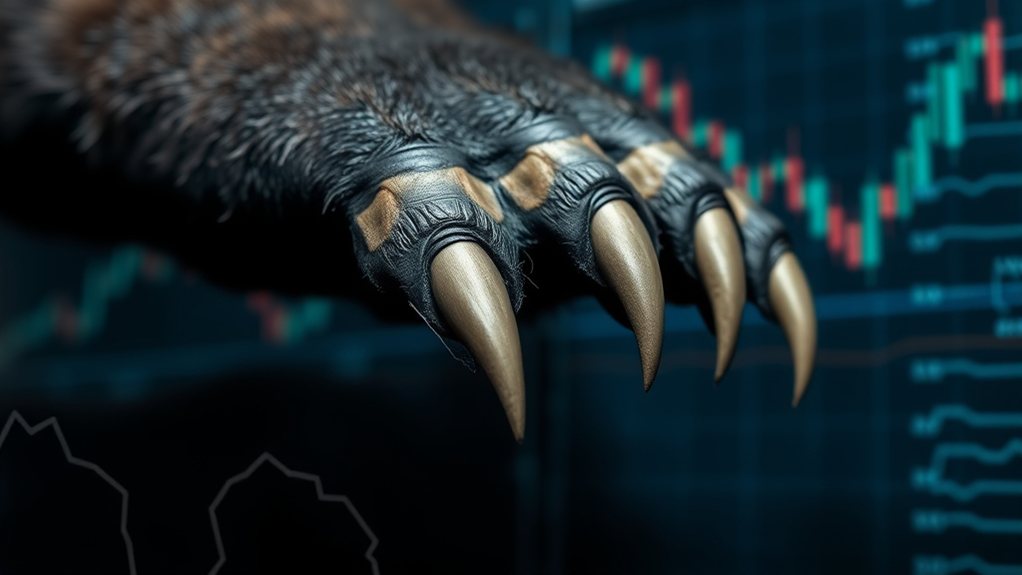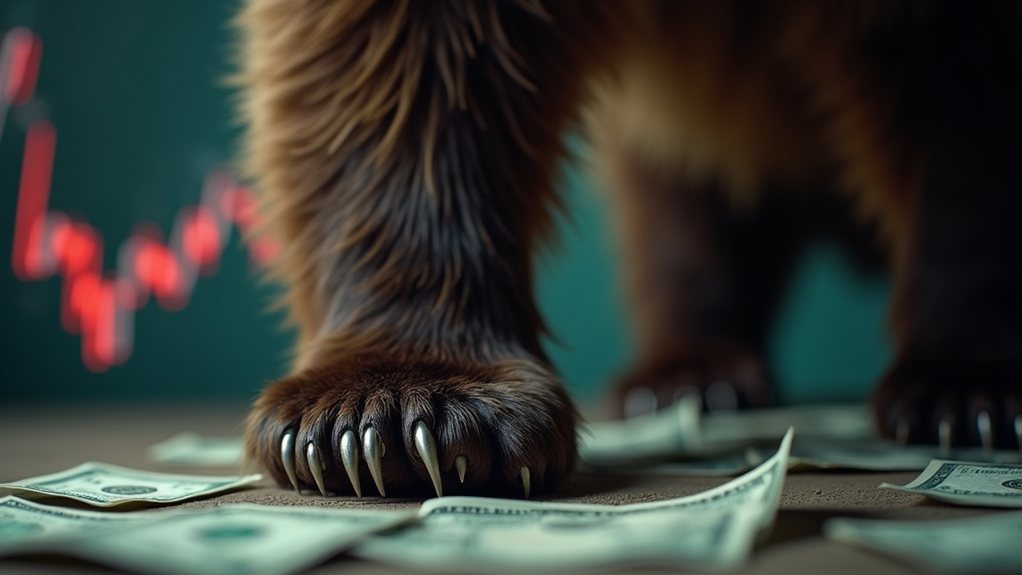The term "bear market" dates back to 18th century London, where "bearskin jobbers" sold bearskins they didn't own yet. They bet prices would drop before delivery, profiting from the decline. The bear's downward striking motion symbolizes falling prices, contrasting with the upward thrust of bulls in rising markets. The phrase gained popularity during the 1720 South Sea Bubble crisis. This naming tradition reflects centuries-old trading psychology that still influences today's financial world.

Panic grips investors when a bear market takes hold. Stock prices fall sharply, and the mood turns gloomy. But have you ever wondered why we call it a "bear" market? The term has an interesting history dating back to 18th century London.
The name comes from "bearskin jobbers," stock market traders in London during the 1700s. These traders would sell bearskins they didn't yet own, hoping to buy them later at a lower price. Bears attack their prey with a downward swipe of their paws, which became a symbol for falling prices. This imagery stuck, and the term "bear market" was born.
The term "bear market" originated with 18th century London traders selling bearskins they didn't own, hoping prices would fall before delivery.
The term gained popularity during the South Sea Bubble financial crisis of 1720. This was one of history's first major market crashes, cementing the bear as a symbol of declining markets. It stands in contrast to the "bull market," where prices rise, named after the upward thrust of a bull's horns.
Today, a bear market has a specific definition. It's a prolonged decline in stock prices of 20% or more from recent highs. These downturns typically last at least two months, though they can stretch much longer. With an average duration of 11.1 months, bear markets can test even the most patient investors. During these periods, pessimism spreads among investors, and negative sentiment dominates market discussions.
Several factors can trigger a bear market. Economic slowdowns, rising unemployment, falling corporate profits, and major global events like wars or pandemics can all play a role. The bursting of market bubbles, when prices have risen too high too quickly, often leads to bear markets.
History has seen many notable bear markets. The Great Depression (1929-1932) saw the S&P 500 fall 89%. During the 2008 financial crisis, markets dropped 57%. The COVID-19 pandemic triggered a swift 34% decline in early 2020.
Bear markets don't follow a predictable schedule, but they occur roughly once every 3.6 years. The average bear market lasts about 289 days, or just under 10 months. The shortest lasted just 33 days during the COVID-19 pandemic, while the longest dragged on for 929 days from 1946 to 1949.
During bear markets, investors often move money to safer assets like bonds and gold. Bear markets typically progress through distinct phases, beginning with distribution where large investors quietly sell, followed by public participation, and ending with panic selling. Market volatility increases, and trading volumes can spike as investors react to changing conditions. In cryptocurrency markets, fear sentiment tends to be even more pronounced, leading to sharper declines than in traditional markets. Economic indicators typically turn negative, and both consumers and businesses reduce spending.
Since 1928, the S&P 500 has experienced 26 bear markets. While they're challenging periods for investors, they're a normal part of market cycles. Understanding the origin of the term "bear market" provides historical context to these inevitable downturns that have challenged investors for centuries.
Frequently Asked Questions
How Long Do Bear Markets Typically Last?
Bear markets typically last about 9.6 months on average, though their duration varies considerably.
Since 1929, these downturns have averaged 289 days, much shorter than bull markets which typically run for 2.6 years.
They've ranged from just one month to 1.7 years in length.
The 2020 pandemic bear market was unusually brief, lasting only 33 days before recovery began.
Can Individual Stocks Experience Bear Markets Independently?
Yes, individual stocks can experience bear markets independently of the broader market. This happens when a specific stock falls 20% or more from its recent high.
Company-specific issues like poor earnings, management problems, or industry disruptions often trigger these declines. For example, Meta dropped 76% in 2022, and Netflix fell 77% from late 2021 to mid-2022, even when many other stocks were performing well.
What Sectors Perform Better During Bear Markets?
During bear markets, certain sectors typically perform better than others.
Defensive sectors like utilities, consumer staples, and healthcare often show resilience as they provide essential products and services.
Telecommunications and real estate can offer stability through steady dividends.
Companies in countercyclical industries, such as gold miners and discount retailers, may even see growth during economic downturns.
Low volatility stocks with stable earnings also tend to decline less than the broader market.
How Do International Markets Correlate During Bear Markets?
International markets tend to move together more closely during bear markets.
Studies show correlations between markets can jump from 0.3-0.5 in normal times to 0.7-0.8 during downturns.
This "correlation breakdown" makes diversification less effective when investors need it most.
While emerging markets historically offered better diversification than developed markets, even these connections have strengthened over time due to global economic integration and coordinated selling during crises.
Should Investors Change Their Retirement Strategies During Bear Markets?
During bear markets, experts say retirement strategies shouldn't undergo major changes.
Investors typically benefit from staying focused on long-term goals. Research shows that maintaining regular contributions, especially through dollar-cost averaging, often works better than trying to time the market.
Financial planners note that emergency funds become particularly important during market downturns. Those near retirement might consider reviewing their asset allocation to guarantee it matches their risk tolerance.














